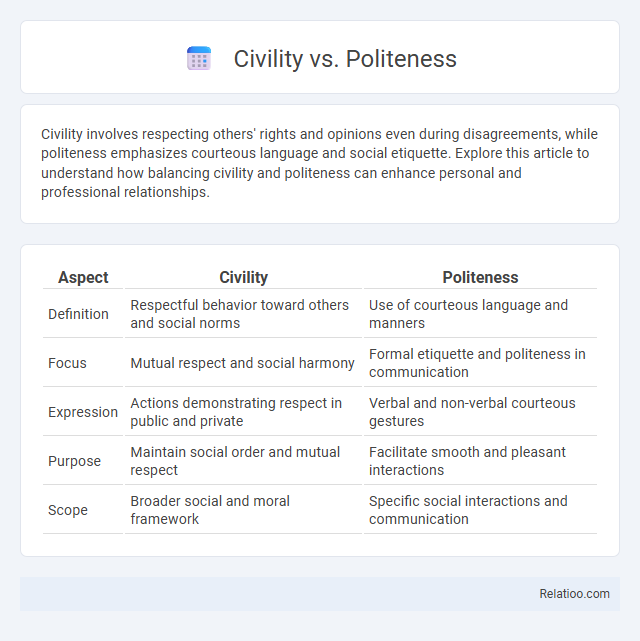Civility involves respecting others' rights and opinions even during disagreements, while politeness emphasizes courteous language and social etiquette. Explore this article to understand how balancing civility and politeness can enhance personal and professional relationships.
Table of Comparison
| Aspect | Civility | Politeness |
|---|---|---|
| Definition | Respectful behavior toward others and social norms | Use of courteous language and manners |
| Focus | Mutual respect and social harmony | Formal etiquette and politeness in communication |
| Expression | Actions demonstrating respect in public and private | Verbal and non-verbal courteous gestures |
| Purpose | Maintain social order and mutual respect | Facilitate smooth and pleasant interactions |
| Scope | Broader social and moral framework | Specific social interactions and communication |
Understanding Civility: Core Principles
Understanding civility involves recognizing respect, empathy, and active listening as its core principles, essential for harmonious social interaction. Unlike politeness, which often focuses on surface-level manners, civility demands genuine consideration for others' dignity and viewpoints. Your capacity to practice civility strengthens community trust and fosters constructive dialogue in diverse environments.
Defining Politeness: Social Etiquette Explained
Politeness refers to the social etiquette and behaviors that demonstrate respect and consideration for others in everyday interactions, including using courteous language and observing cultural norms. Civility, while overlapping with politeness, emphasizes maintaining a respectful and non-hostile attitude, especially in public discourse and disagreements. Understanding these distinctions helps Your communication remain both respectful and contextually appropriate in diverse social settings.
Historical Contexts: Civility vs Politeness
Civility originated from Latin *civilitas*, historically linked to citizenship and social order in Roman society, emphasizing duties and respect within communal life. Politeness emerged from courtly manners in European aristocracy during the Renaissance, focusing on etiquette and social grace among elites. While civility refers to the broader concept of societal respect and moral conduct, politeness pertains to specific behaviors and customs that facilitate smooth social interactions.
The Psychological Impact of Civility
Civility fosters a sense of community and mutual respect, significantly reducing stress and promoting psychological well-being by creating safe social environments. Unlike politeness, which often involves superficial social etiquette, civility involves genuine consideration and empathy that improve emotional resilience and reduce feelings of alienation. Psychological studies reveal that environments rich in civility enhance cooperation, reduce conflict, and contribute to higher overall mental health outcomes.
Behavioral Outcomes: Politeness in Practice
Politeness in practice promotes harmonious social interactions by encouraging respectful language and considerate actions, which often leads to positive behavioral outcomes such as cooperation and reduced conflict. Unlike civility, which emphasizes mutual respect and moral conduct in public life, politeness focuses more on etiquette and social norms that guide interpersonal behavior. You can enhance your relationships by practicing politeness, as it helps create an environment where people feel valued and understood.
Key Differences Between Civility and Politeness
Civility refers to respectful and considerate behavior towards others, emphasizing social harmony and mutual respect, while politeness involves specific social norms and manners designed to avoid offense and demonstrate courtesy. The key difference lies in civility's broader focus on ethical conduct and genuine respect, whereas politeness often follows conventional rules that can sometimes mask true feelings. Your ability to distinguish between civility and politeness strengthens interpersonal relationships and promotes authentic social interactions.
The Role of Culture in Shaping Civility
Culture significantly shapes civility by influencing the social norms and expectations that dictate respectful behavior within a community. While politeness often reflects specific language and etiquette rules, civility encompasses a broader range of actions that promote mutual respect and social harmony, varying widely across cultures. Your understanding of civility improves when you consider cultural context, as behaviors deemed civil in one society may differ substantially in another.
Politeness Norms Across Societies
Politeness norms vary widely across societies, reflecting cultural values and social hierarchies that guide appropriate behavior and communication. Understanding these norms helps you navigate social interactions respectfully, as what is considered polite in one culture may differ greatly in another. These variations influence language use, gestures, and etiquette, emphasizing the importance of context in interpreting civility and politeness.
Civility and Politeness in Workplace Dynamics
Civility in workplace dynamics refers to showing respect, recognizing others' humanity, and fostering an environment of mutual trust, while politeness involves adhering to social norms and courteous behavior. Civility promotes long-term positive relationships and collaboration, whereas politeness may sometimes mask true feelings to maintain surface-level harmony. Prioritizing civility over mere politeness encourages authentic communication and reduces conflicts, enhancing productivity and employee satisfaction.
Promoting Civility Over Mere Politeness
Promoting civility over mere politeness emphasizes genuine respect and empathy in interpersonal interactions, going beyond surface-level manners. Civility fosters a culture of understanding and constructive dialogue, which strengthens social cohesion and trust. You can contribute to a more harmonious community by prioritizing civility as the foundation for meaningful and respectful communication.

Infographic: Civility vs Politeness
 relatioo.com
relatioo.com